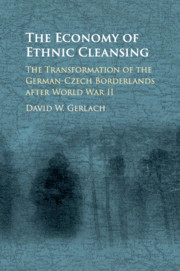Crossref Citations
This Book has been
cited by the following publications. This list is generated based on data provided by Crossref.
Bryant, Chad
2018.
Habsburg History, Eastern European History … Central European History?.
Central European History,
Vol. 51,
Issue. 1,
p.
56.
Testa, Patrick
2018.
The Economic Legacy of Expulsion: Lessons from Postwar Czechoslovakia.
SSRN Electronic Journal ,
Zborowska, Agata
2019.
Życie rzeczy w powojennej Polsce.
Martin, Guzi
Peter, Huber
and
Štěpán, Mikula
2019.
Old sins cast long shadows: The Long-term impact of the resettlement of the Sudetenland on residential.
MUNI ECON Working Papers,
Mulder, Nicholas
2020.
The Trading with the Enemy Acts in the age of expropriation, 1914–49.
Journal of Global History,
Vol. 15,
Issue. 1,
p.
81.
Dziuban, Zuzanna
and
Stańczyk, Ewa
2020.
Introduction: The Surviving Thing: Personal Objects in the Aftermath of Violence.
Journal of Material Culture,
Vol. 25,
Issue. 4,
p.
381.
Kończal, Kornelia
2021.
German property and the reconstruction of East Central Europe after 1945: politics, practices and pitfalls of confiscation.
European Review of History: Revue européenne d'histoire,
Vol. 28,
Issue. 2,
p.
278.
Stańczyk, Ewa
2021.
Szaber in post-war Poland: satirising plunder in Polish magazine cartoons (1945-1946).
Journal of Graphic Novels and Comics,
Vol. 12,
Issue. 5,
p.
857.
Lieberman, Benjamin
2021.
From Nationalism to National Indifference: Binary Logic and Sense of Time.
Nationalities Papers,
Vol. 49,
Issue. 5,
p.
855.
Testa, Patrick A
2021.
The Economic Legacy of Expulsion: Lessons from Post-War Czechoslovakia.
The Economic Journal,
Vol. 131,
Issue. 637,
p.
2233.
Johnston, Rosamund
2021.
Listening in on the Neighbors: The Reception of German and Austrian Radio in Cold War Czechoslovakia.
Central European History,
Vol. 54,
Issue. 4,
p.
603.
Thaler, Peter
2022.
Collective Identities and Post-War Violence in Europe, 1944–48.
p.
253.
Zborowska, Agata
2022.
Between Hospitality and Hostility: The Experience of Migration Through Things.
Journal of Intercultural Studies,
Vol. 43,
Issue. 5,
p.
573.
Mikula, Štěpán
Reggiani, Tommaso
and
Sabatini, Fabio
2023.
The long-term impact of religion on social capital: lessons from post-war Czechoslovakia.
MUNI ECON Working Papers,
Frankl, Michal
2024.
Vast Workshop and Laboratory: Labor and Refugees to the Bohemian Lands and Czechoslovakia, 1914–39.
Austrian History Yearbook,
p.
1.





